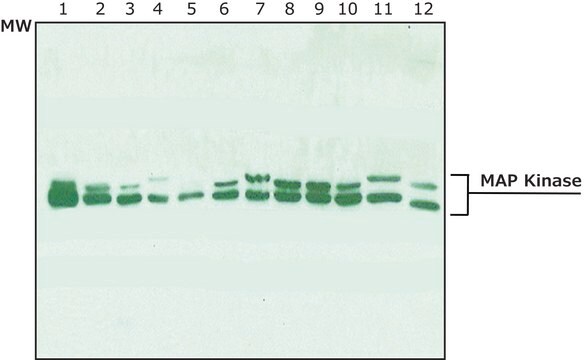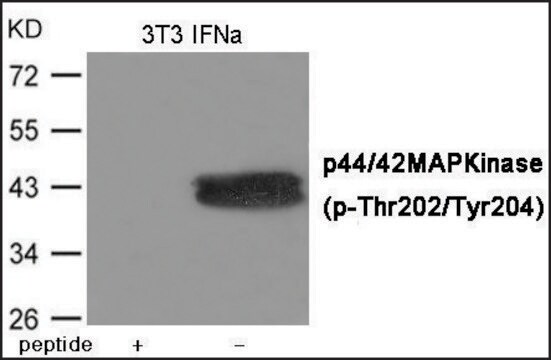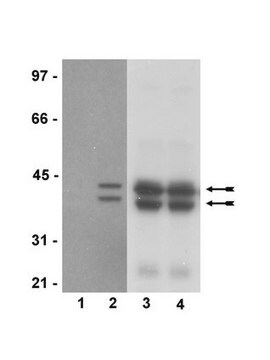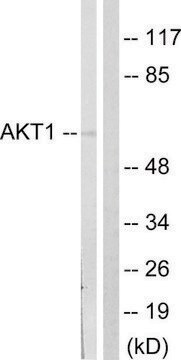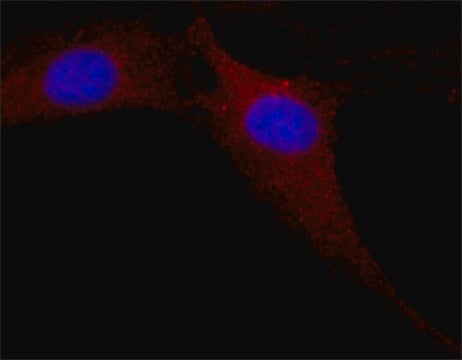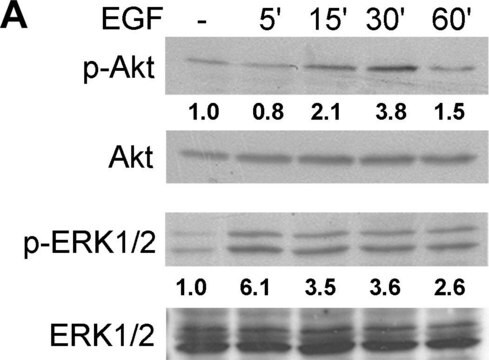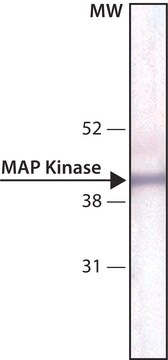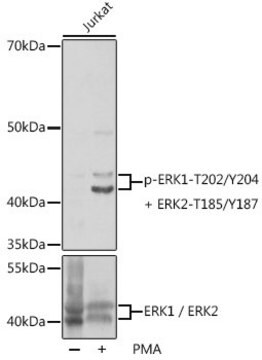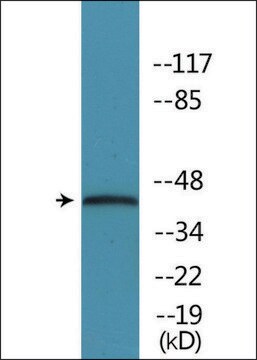E7028
Anti-phospho-ERK1 (pThr202/pTyr204) and ERK2 (pThr185/pTyr187) antibody produced in rabbit
affinity isolated antibody, buffered aqueous solution
동의어(들):
Phospho ERK Antibody - Anti-phospho-ERK1 (pThr202/pTyr204) and ERK2 (pThr185/pTyr187) antibody produced in rabbit, Phospho Erk Antibody, Anti-MAPK
로그인조직 및 계약 가격 보기
모든 사진(3)
About This Item
추천 제품
생물학적 소스
rabbit
Quality Level
결합
unconjugated
항체 형태
affinity isolated antibody
항체 생산 유형
primary antibodies
클론
polyclonal
양식
buffered aqueous solution
종 반응성
rat, chicken, human, mouse
기술
immunocytochemistry: suitable
western blot: suitable
UniProt 수납 번호
배송 상태
wet ice
저장 온도
−20°C
유전자 정보
human ... MAPK3(5595)
mouse ... Mapk3(26417)
rat ... Mapk3(50689)
관련 카테고리
일반 설명
Extracellular Signal-Regulated Kinases (ERKs) are members of mitogen-activated protein kinase superfamily (MAPK). MAPK cascade is an evolutionary conserved module that mediates the signaling from various extracellular stimuli to the nucleus. The well-characterized ERK module is activated in response to stimuli such as cytokines, growth factors, osmotic shock, or UV irradiation. ERKs regulate transcription, cell cycle, differentiation, learning, and memory through signal transduction in the cytoplasm and the nucleus. ERK1 and 2 phosphorylate microtubule-associated protein-2 (MAP2), myelin basic protein (MBP), and ELK-1. They may promote entry in the cell cycle. The ERK cascade connects to G proteins through a multitude of distinct signal transduction pathways. ERK1 (p44) and ERK2 (p42) require the dual phosphorylation in the catalytic kinase domain by MEKs for their full activity. ERK1 is phosphorylated on Tyr204 and Thr202, and ERK2 on Tyr187 and Thr185.
Mitogen-activated protein kinase (MAPK) superfamily of enzymes is involved in widespread signalling pathways. Members of this family include the ERK1/2 (extracellular signal-regulated protein kinase, also termed p42/p44 MAPK), JNK and p38 MAPK subfamilies. These are the terminal enzymes in a signalling cascade where each kinase phosphorylates and activates the next member in the sequence. Phosphorylation of both tyrosine and threonine is essential for the full activation of all MAPKs. Several kinases participate in activation of the ERK cascade. This cascade is initiated by the small G protein Ras, which upon stimulation causes activation Raf1 kinase. Raf1 continues the transmission by activating MEK. Activated MEK appears to be the only kinase capable of specifically phosphorylating and activating ERK. ERK1 (p44) and ERK2 (p42) require the dual phosphorylation in the catalytic kinase domain by MEKs for their full activity. ERK1 is phosphorylated on Tyr204 and Thr202, and ERK2 on Tyr187 and Thr185. ERK1 and 2 may also undergo autophosphorylation on these residues. ERK appears to be an important regulatory molecule, which by can phosphorylate regulatory targets in the cytosol (phospholipase A2, PLA2), translocated into and phosphorylate substrates in the nucleus (ELK1). The activation of ERK cascade mediates and regulates the signal transduction pathways in response to stress, mitogenic signals and is important in development and differentiation, learning, memory and survival.
This antibody recognises endogenous active forms of ERK1/2 (44/42 kDa) in human, mouse, rat and chick embryo.
This antibody recognises endogenous active forms of ERK1/2 (44/42 kDa) in human, mouse, rat and chick embryo.
특이성
Rabbit polyclonal anti-phospho-ERK1 (pThr202/pTyr204) and ERK2 (pThr185/pTyr187) antibody recognizes endogenous active forms of ERK1 & 2 (44 kDa and 42 kDa, respectively) in a variety of cell types, including human, mouse, rat and chick embryo.
면역원
synthetic phosphopeptide derived from the region of human ERK1 and 2 that contain threonine 202/185 and tyrosine 204/187 respectively.
애플리케이션
A working dilution of 1:1000 is recommended for detection of ERK1 (phosphorylated at Thr202/185) and ERK2 (phosphorylated at Tyr204/187) in PC12 cells. The antibody is also suitable for immunocytochemistry and immunohistochemistry in human midbrain sections at a working dilution of 1:500 and 1:2000, respectively.
Rabbit polyclonal anti-phospho-ERK1 (pThr202/pTyr204) and ERK2 (pThr185/pTyr187) antibody may be used in immunoblotting and immunostaining applications. It is used to detect the presence of activated ERK1 and ERK2.
물리적 형태
Solution in Dulbecco′s with 50% glycerol, BSA and sodium azide.
면책조항
Unless otherwise stated in our catalog or other company documentation accompanying the product(s), our products are intended for research use only and are not to be used for any other purpose, which includes but is not limited to, unauthorized commercial uses, in vitro diagnostic uses, ex vivo or in vivo therapeutic uses or any type of consumption or application to humans or animals.
적합한 제품을 찾을 수 없으신가요?
당사의 제품 선택기 도구.을(를) 시도해 보세요.
Storage Class Code
10 - Combustible liquids
WGK
WGK 1
Flash Point (°F)
Not applicable
Flash Point (°C)
Not applicable
Ying Hu et al.
Investigative ophthalmology & visual science, 51(3), 1747-1754 (2009-10-31)
Retinal ganglion cells (RGCs) die in glaucoma and virtually all optic neuropathies. Recently, novel tropomyosin-related kinase B (TrkB) monoclonal antibodies have been shown to activate TrkB receptors and exert neuroprotective and neurotrophic effects. In the present study, the authors examined
Xiaochen Yang et al.
International journal of molecular medicine, 38(1), 30-38 (2016-05-26)
Fibroblast growth factor receptor (FGFR)-like protein 1 (FGFRL1) is the most recently discovered member of the FGFR family. Owing to the fact that it interacts with FGF ligands, but lacks the intracellular tyrosine kinase domain, several researchers have speculated that it may function as
Michael B Steketee et al.
Proceedings of the National Academy of Sciences of the United States of America, 108(47), 19042-19047 (2011-11-09)
Understanding neurite growth regulation remains a seminal problem in neurobiology. During development and regeneration, neurite growth is modulated by neurotrophin-activated signaling endosomes that transmit regulatory signals between soma and growth cones. After injury, delivering neurotrophic therapeutics to injured neurons is
Ahmed Hasbi et al.
Frontiers in pharmacology, 8, 924-924 (2018-01-23)
A significant subpopulation of neurons in rat nucleus accumbens (NAc) coexpress dopamine D1 and D2 receptors, which can form a D1-D2 receptor complex, but their relevance in addiction is not known. The existence of the D1-D2 heteromer in the striatum
Siwei Zhang et al.
PloS one, 8(11), e79469-e79469 (2013-11-19)
Embryonic development requires exquisite regulation of several essential processes, such as patterning of tissues and organs, cell fate decisions, and morphogenesis. Intriguingly, these diverse processes are controlled by only a handful of signalling pathways, and mis-regulation in one or more
자사의 과학자팀은 생명 과학, 재료 과학, 화학 합성, 크로마토그래피, 분석 및 기타 많은 영역을 포함한 모든 과학 분야에 경험이 있습니다..
고객지원팀으로 연락바랍니다.